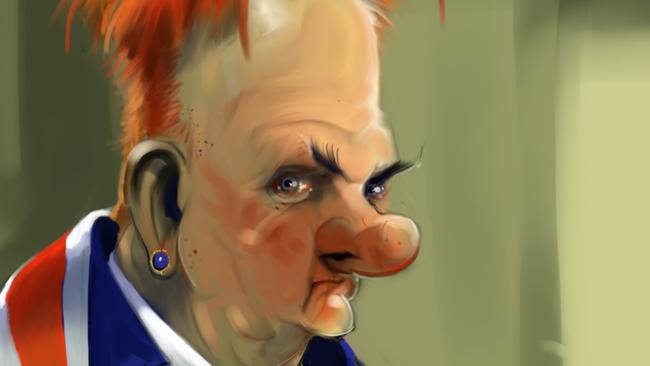Robocall shows true mark of Latham

The emerging partnership of Mark Latham with Pauline Hanson is interesting, but not because it proves Latham has changed. Their long record of public differences hardly matters.
Even if Latham eating his own words was surprising, it would say something about his weak past convictions, not his present actions. This is where Graham Richardson’s “king rat” attack fails — although it certainly got under Latham’s skin and made for good television.
It’s not news that Latham is betraying Labor and it’s not smart to make him seem important.
What’s news is that Latham is betraying Latham. And the only important thing about this man who for so long traded on being different from the rest is what he has in common with Hanson.
Hanson was always just another politician. Latham is now just another politician too, like her.
Consider this. Forget Latham’s notorious parliamentary super. What is he doing in this robocall? Sponging off public-funded entities, working up tricksy electorate-level tactics, pursuing decades-old grudges through the public discourse. These are the accusations he would throw at political and media insiders, the Liberal machine men such as Tony Staley and Tony Abbott and Labor’s “roosters” Wayne Swan, Stephen Conroy and Stephen Smith, and the claque of commentators he called “dancing bears”.
Now, Hanson and Latham deserve each other, while voters deserve to know the significance of their union.
I was Mark Latham’s closest adviser in the three years when he went from ratbag Financial Review columnist to Labor leader in an election year. We last spoke in January 2005 shortly before he resigned the Labor leadership and began his long reversion to the mean. The reason I went to work for Mark after the 2001 election? Above all else, he promised to be different from the rest. He would be different from Paul Keating, Kim Beazley and Simon Crean — in touch with the suburbs, with policy conviction, talking in values and stories, not processes and lines. And different from John Howard — talking straight, not in lawyerly evasions; empathising with fear of disorder, not flicking the scab of racial prejudice; using political and economic power to help people climb the ladder, not using the bully pulpit of parliament to reassure them there was someone below.
Back then Mark was a proper outsider, and that was good.
Latham doesn’t do irony, so it’s obviously chance that his upcoming book Take Back Australia will republish the best expression of the insider-outsider idea, his 2002 Menzies Lecture at the Menzies Centre for Australian Studies at King’s College London, even while it reheats the most dire and reductive derivations from this idea from the long years since.
This is why hearing Latham’s voice through my earphones this week reading out a script given to him by a minor party hack was so unnerving. The line between a robocall on a news website and a voicemail message from the man himself is rather a fine one. In the days before that insider-outsider speech 16 years ago (while Mark was in London, his diary officer was in Campbelltown and I was in Canberra) I received more than one Latham voicemail.
Not about the speech but because Mark couldn’t get his Outlook calendar to change to GMT.
There is no depth of invective he has plumbed in the years since that went further than his words in those dark days. But somehow, despite this champagne workplace comedy, the Menzies Lecture is a rare speech that’s still worth reading 16 years down the track. I should know because I wrote about half of it.
Above all, the shared endeavour of that speech was a serious attempt to take the implicit insider-outsider dynamic of the middle Howard years (battlers and aspirationals versus out-of-touch elites) and make three key revisions.
First, to make it explicit, and in turn illustrate its limitations — it’s just another dialectic, not some world-historical insight. Second, to put some real geography in it and upset the pretence that the bohemian bourgeois inner suburbs of Sydney’s inner west or Melbourne’s inner north were any more “inside” than the liberal bourgeois leafy suburbs of Sydney’s north or Melbourne’s east. And third, to put the political economy back into it. That Menzies speech was a determined essay into the economic underpinnings of Australian inclusion and exclusion and a refutation of the post-materialism of culture warriors left and right.
The best lines? “Abstract lifestyle has produced an abstract style of politics. Symbolic and ideological campaigns are given top priority. This involves a particular methodology: adopting a predetermined position on issues and then looking for evidence to support this position. In the suburbs, the value set is more pragmatic.” Considerable foresight. Little self-knowledge.
When we demystify Hanson (and Latham) as just another politician, we limit her (and his) appeal — and then we can counter it. This is the key. How? A simple enough formula. Governing beats politics. Real-life benefits like tax cuts and wage rises plus democratic, inclusive patriotism will see them off.
Michael Cooney, national director of the Australian Republic Movement, was an adviser to Mark Latham MP from 2002 to 2005.





